The books that have shaped our perspective.
The books below provide context for some of the issues we hope to help address through employee ownership, including the need for greater access to economic opportunity and financial security among workers.
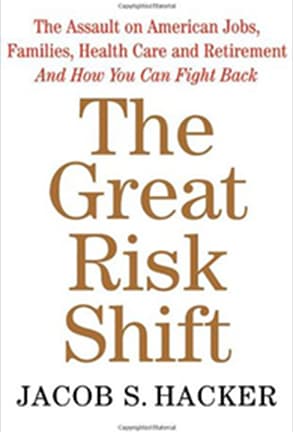
The Great Risk Shift
by Jacob Hacker — Yale University Press, 2006
Hacker chronicles what has happened to hourly workers over the last 50 years. He describes how we’ve transformed from welfare capitalism — from companies basically taking care of employees for life through lifetime employment, gold-plated healthcare, defined benefit pension plans, etc. — to the other extreme: at-will employment, no worker protections, lots of temporary labor, bare-bones healthcare with high deductibles, a 401K retirement system in which the employee bears most of the responsibility. Hacker argues that these risk-redistributive policies don’t make any sense in their own terms.
High degrees of personal risk are a hindrance, rather than a spur, to beneficial economic activity. If people perceive that their jobs are risky, they’re likely to underinvest in specialized training (here, there is a well-established literature in political economy which suggests that an extensive welfare state goes hand-in-hand with the development of specialized skills). Personal investments in education are less attractive if the rewards from education are highly uncertain.
“Over the last generation…we have witnessed a sweeping transformation away from an all-in-the-same-boat philosophy of shared risk toward a go-it-alone vision of personal responsibility...a massive transfer of economic risk from broad structures of insurance, including those sponsored by the corporate sector as well as by government onto the fragile balance sheets of American families.”
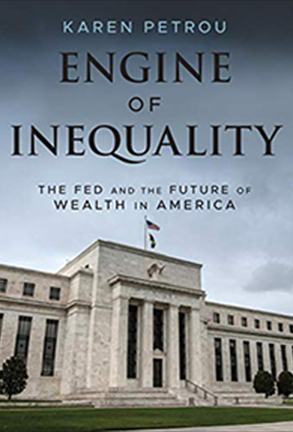
Engine of Inequality: The Fed and the Future of Wealth in America
by Karen Petrou — Wiley & Sons, 2021
Petrou describes the impact that Fed policy has had, and continues to have, on inequality.
Part of the issue is the well-documented impact of Fed policy on asset prices, which have ballooned wealth at the top and placed home and other asset ownership out of reach for most of the country. Furthermore, the combination of high capital charges and low interest rates has made small dollar loans to individuals and small business unappealing to lenders.
“We are a nation in which at least a quarter of middle-class households still can’t even afford the medical treatment they require, lower-income millennials have student debt equal to at least 372 percent of income, and still more won’t be able to handle even a $400 unexpected expense. This is wealth without prosperity, a violation of every tenet in the Fed’s statutory mandate. Instead of regretting inequality even as it makes inequality worse, the Fed can and must quickly rewrite policy with a new goal in mind: shared prosperity, measured by how most of us do, not by how high the market flies.”
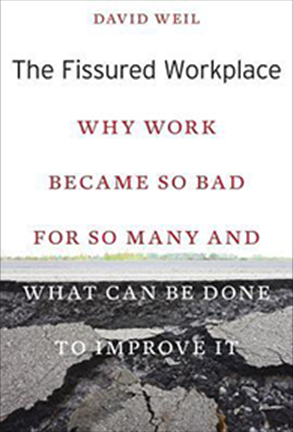
The Fissured Workplace: Why Work Became So Bad for So Many
by David Weil — Harvard University Press, 2014
For much of the twentieth century, as Weil explains, large companies employing many workers formed the bedrock of the U.S. economy. Today, sustaining the employer-worker relationship is often a much lower priority than building a devoted customer base and delivering value to investors.
The Fissured Workplace unearths the extent to which large corporations have shed their role as direct employers of the people responsible for their products, in favor of outsourcing work to small companies that compete fiercely with one another. The result has been declining wages, eroding benefits, inadequate health and safety conditions, and widening income inequality.
“Every day, many of us eat at restaurants, stay at hotels, receive packages, and use our digital devices with the assumption that the branded company we pay for these services also employs the people who deliver them. This assumption is increasingly incorrect: Our deliveries are often made by contractors and our hotel rooms are cleaned by temporary employees from staffing agencies. This is what I call the fissured workplace, the cracks upon which today’s economy largely rest, and it leaves so many without fair and decent wages, a career path, and a safe work environment.”
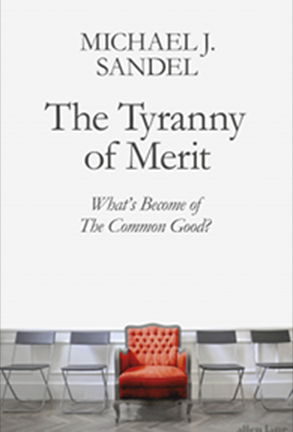
The Tyranny of Merit: Can We Find the Common Good?
by Michael Sandel — Farrar, Straus, & Giroux, 2020
We’ve convinced ourselves that whatever success we’ve encountered in life is attributable to our own hard work. That conception is bad all around because it leaves no room for grace or gratitude. And for the less fortunate, it makes them feel like it’s all their fault.
When we all know there are so many factors at play: who your parents are, where you grew up, what type of education you had, not to mention dumb luck. It’s yet another argument for broadening ownership – no one does anything on their own in this life so we all have an obligation to share and to give back.
“Even a fair meritocracy, one without cheating or bribery or special privileges for the wealthy, induces a mistaken impression: that we have made it on our own...a notion that undermines social recognition and esteem for those who lack the credentials the system rewards, and leads to unfounded prejudice against those less educated.”
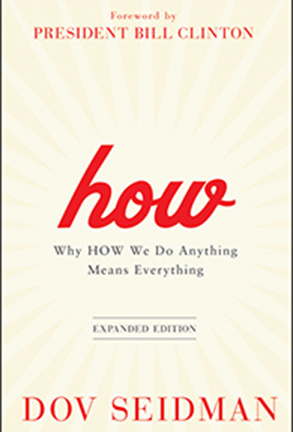
How: Why How We Do Anything Means Everything
by Dov Seidman — Wiley & Sons, 2011
Seidman makes the case that “it’s not what you do that matters most and sets you apart from others, but how you do what you do.” For example, a committed capitalist still operates within a free market, but Seidman emphasizes the importance of choosing how to operate within a particular set of conditions.
To illustrate, it’s how that committed capitalist responds to hard decisions spurred by challenging situations, such as a macroeconomic downturn or merger. How should you treat people? How much severance will be provided? What should you do with outplacement services? How should you communicate with employees? We have a choice in every circumstance to approach how we do things with compassion and build trust with others.
“In a connected world, countries, governments and companies also have character, and how they do what they do, how they keep promises, how they make decisions, how things really happen inside, how they connect and collaborate, how they engender trust, how they relate to their customers, to the environment and to the communities in which they operate is now their fate.”